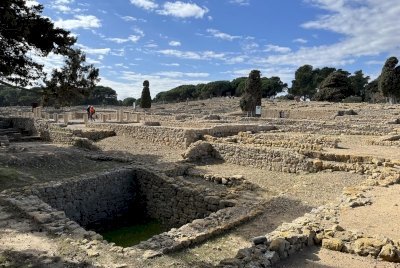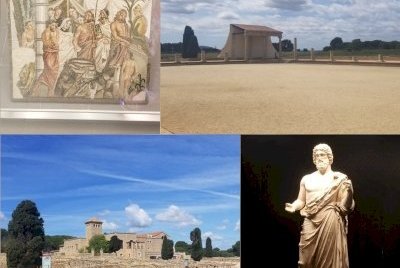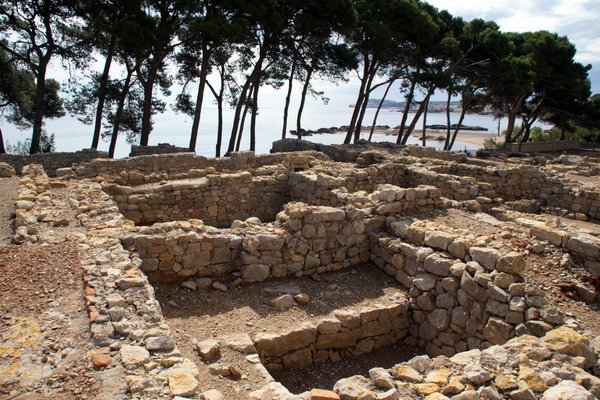Spain
Empuries Greek Archaeological ensemble
Empúries was an ancient city on the Mediterranean coast in northeastern Spain.
The city was founded in the early 6th century BCE by Greek merchants from Phocaea (Ionia). Empúries was occupied by the Romans at the end of the 3rd century BCE and was the starting point for the Roman conquest of the Iberian Peninsula. The archaeological site includes the sector of the Greek city and remains of the Roman municipal city.
Site Info
Official Information
- Full Name
- Greek Archaeological ensemble in Empúries, l'Escala, Girona (ID: 1051)
- Country
- Spain
- Status
-
On tentative list 2002
Site history
History of Empuries Greek Archaeological ensemble
- 2002: Added to Tentative List
- Added to tentative list
- Type
- Cultural
- Criteria
Links
- UNESCO
- whc.unesco.org
All Links
UNESCO.org
- whc.unesco.org — whc.unesco.org
Community Information
- Community Category
- Archaeological site: Ancient Greece
Travel Information
Recent Connections
News
No news.
Recent Visitors
Visitors of Empuries Greek Archaeological ensemble
- Alexander Lehmann
- AYB
- Bin
- campmany
- Can SARICA
- Caspar
- Catoplayer
- David Aaronson
- David Berlanda
- Dimitrios Polychronopoulos
- DouglasR
- Femke Roos
- Hubert
- Jana and Matt
- Lara Adler
- Lisu Marian
- Maciej Gil
- Małgosia Łupicka
- Paul Schofield
- Priyaranjan Mohapatra
- RobRos
- Roman Bruehwiler
- Sebasfhb
- Solivagant
- Stanislaw Warwas
- Szucs Tamas
- Van Hung
Community Reviews
Show full reviewsCaspar
Empuries Greek Archaeological ensemble
Empuries Greek Archaeological ensemble (On tentative list)

Empuries is about one hour by bus from Gerona. I found only one connection that made sense which left Gerona around 9am and returned from L'Escala around 2pm which gives you plenty of time to visit the ruins. From the bus stop Empuries it is about a twenty minute walk to the site and it is worth walking the small detour along the beach since Empuries is located on a lovely bay with beaches everywhere. In February swimming was no temptation for me but I enjoyed it nonetheless.
The access to the archeological site is via a very modern looking Libeskind like visitor center. The entrance fee was very modest with 6 Euros and the excellent audio guide is included. There are lockers, toilets and vending machines. From there you walk over to the first area: the Greek town. This is impressive in so far as it is very extended and the foundation walls are clear everywhere. With the audioguide to get a feeling for the function or different areas as markets, temples, private houses etc. Best preserved are the subterranean structures like cisterns and reservoirs. It adds hugely to the experience almost to the point of being distracting that you have always the deep blue sea and the beautiful bay around you. So it is a little like Pompei as you can walk the streets and get an idea how people lived here. But other then in Pompei there is really very little left that is higher then …
Keep reading 0 commentsZoë Sheng
Empuries Greek Archaeological ensemble
Empuries Greek Archaeological ensemble (On tentative list)

Empúries, with the emphasis on plural S, are ancient ruins at the east coast of Catalonia, a good 2h away from the Barcelona and apparently getting plenty of French tourists. With the Dali museum in Figueres nearby it is not entirely off the beaten track but the smaller roads one has to take is exactly the reason why the towns fell into ruins so long ago. The Roman roads neglected the towns of Empuries and other port towns were favored over them.
I wasn't sure if I should bother with it either. I watched a video about the ruins and saw some pictures and wasn't impressed at all. I am so glad I ignored my first impression. The entrance is €5.50 and includes a small guide pamphlet but more importantly an audio guide in 6 languages. The guide is really what sells this place. It made me wonder if there is a specific site that rates audio guides for sites or if WHS audio guides may warrant an extra rating for it. If you just wander through the ruins, reading the few panels and trying to make sense of things plus reading up stuff online would be silly. Rightly so the museum knows this and doesn't charge an extra few bucks for this.
The most interesting and unique section is he Greek town. An old trade port later annexed by the Romans but always separate until the towns demises, is what I would see as a definite inclusion …
Keep reading 0 comments
